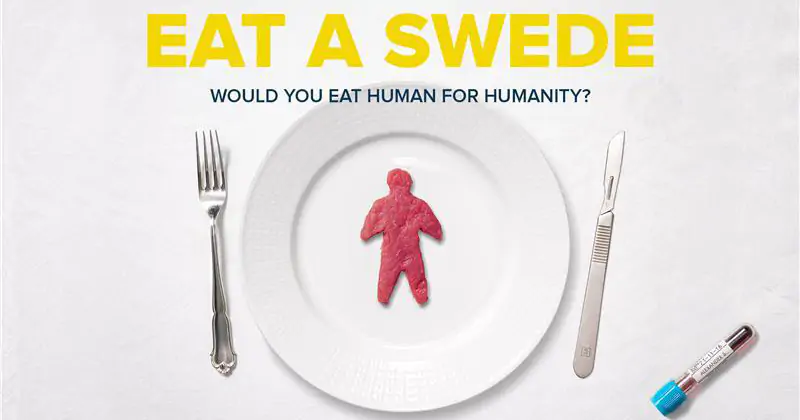By Maria Koulourioti,
Some might say that the words “ethical” and “cannibalism” belong in the context of an unpleasant joke. However, the darkest parts of human existence never fail to overcome moral and societal barriers that are imposing the rules which protect both dignity and freedom. In this case, the consumption of human flesh might sound dreadful to the majority, although some voices try to advocate for the right of “legally tasting their best friend”.
You are what you eat receives a dramatic new meaning when it comes to those who wish to taste human flesh. As nutrition and healthy eating is not only a matter of attention but a great challenge for individuals of the 21st century, from famine, provoked simultaneously by overpopulation and overexploitation, to choosing organic, gluten-free, “luxury” products.
And for the million dollar question that the tabooists like to pose: Why do we consider it unethical to give back to the world and allow other people to live by donating our bodies to packaging institutions once we are gone, while we don’t see an issue with donating our corpses for scientific research purposes and experiments? The idea is straightforward. It involves utilizing our flesh to feed other people. We’ve all heard of castaways or crash survivors who had to eat their partners to survive, and while these tales are usually horrific, they are also logical given the circumstances.

In these circumstances, or if people give their consent to have their flesh eaten, it is referred to as “ethical cannibalism,” as opposed to situations where someone injures another person without their consent only to obtain a piece of skin. Indeed, most individuals believe that cannibalism is permitted in severe circumstances (for example, when it is vital for survival). In the scenario above, the survivors opted to consume their already dead friends. Their intention was never to murder; instead, they went to their final source of nourishment, which was tragically their slain companions.
Should they have died of starvation because of a taboo imposed on a long ingrained impulse in our desire to survive? Are they bad for ultimately succumbing after doing everything they could to escape it?
The three most prominent Kantian arguments against cannibalism employ “The Formula of Humanity.” According to this understanding of the categorical imperative, other individuals should be considered as objectives rather than merely means. According to the first argument, while cannibalizing another person, the human is only a tool (for example, to satisfy our needs). We are losing sight of the dignity that every human being deserves. As a conclusion, cannibalism is a violation of moral law. Many thinkers, however, doubt or even dismiss the dignity of a departed person, claiming that they are not human beings.

However extreme as an example as it may sound, in 2001, a German called Armin Meiwes used a cannibalism fetish website to find someone willing to be killed and eaten. Following their rendezvous, Meiwes murdered the victim and slaughtered his body, preserving the flesh for future enjoyment. He was later captured and jailed many months later for manslaughter, despite the whole world’s shock and understanding of the victim’s agreement to be unalived and consumed. A second case regarding the ethics of cannibalism takes place in 1972, where the survivors of Uruguayan Air Force Flight 571, an English rugby team, were forced to devour their deceased comrades and friends in their last-ditch struggle to survive in the snow and frigid weather. They did not make this decision lightly; after being stuck for 72 days, they tried to eat the leather of the bags and the foam filling of the flight seats to avoid the inevitable.
Without a doubt, cannibalism is unethical and should be regarded as criminal conduct, similar to the desecration of a body. But is using a fallen comrade criminal conduct when it comes to survival? Some might say it is insulting and dishonoring, degrading them as nothing more than food. Others will argue using Darwin’s theory of evolution, (even going to the extreme) that via technology we can “recycle” human bodies and provide a single solution to multiple challenges, including famine, climate crisis, and overconsumption of animal meat.
This article concludes that there should be a framework that prohibits human consumption as an extension of the Article 3 of the European Convention on Human Rights that prohibits torture, and “inhuman or degrading treatment or punishment”. On the other hand, there are some cases and hypotheses where behind the iceberg of words synonymous with “inhumane”, we can see the outline of the word “ethics”. That is only because, the will of humanity to survive and carry on, sometimes transcends what we as a society have today as a moral base.
References
- Takehara, Issei. Ethics of Cannibalism. academia.edu. Available here
- Do the dead have human rights?. lse.ac.uk. Available here
- Victim of cannibal agreed to be eaten. theguardian.com. Available here




